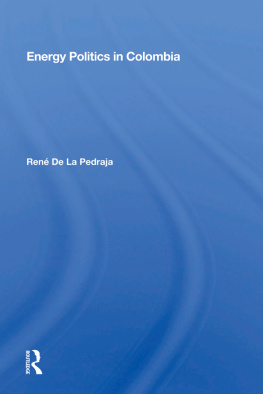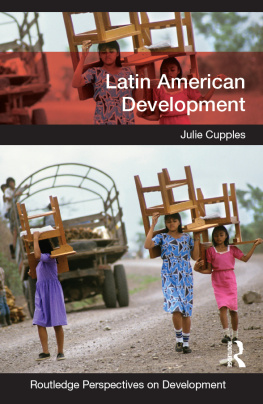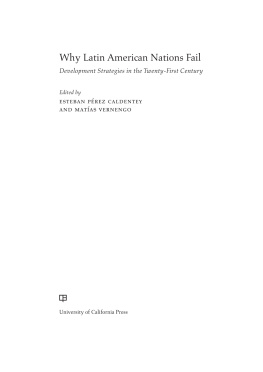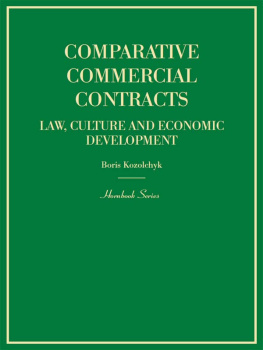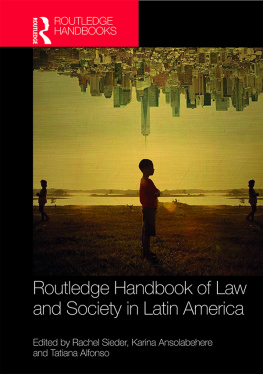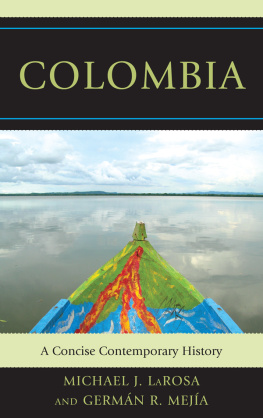Underdevelopment and the Development of Law
Studies in Legal History
Published by The University of North Carolina Press in association with the American Society for Legal History
Editor Morris S. Arnold
EDITORIAL ADVISORY BOARD
John D. Cushing
Lawrence M. Friedman
Charles M. Gray
Thomas A. Green
Oscar Handlin
George L. Haskins
J. Willard Hurst
S. F. C. Milsom
Joseph H. Smith
L. Kinvin Wroth
1980 The University of North Carolina Press
All rights reserved
Manufactured in the United States of America
ISBN 0-8078-1423-7
Library of Congress Catalog Card Number 79-23936
Library of Congress Cataloging in Publication Data
Means, Robert Charles, 1938
Underdevelopment and the development of law.
(Studies in legal history)
Bibliography: p.
Includes index.
1. Corporation lawColombiaHistory.
2. CorporationsColombiaHistory. I. Title. II. Series.
Law 346.86106609 79-23936
ISBN 0-8078-1423-7
Contents
Tables
1. Comparison of 1840 and 1842 Legal Curricula
2. The Colombian Commercial Code of 1853: Changes in the Spanish Model
3. Nineteenth-Century Legal Curricula: Colombia and Harvard
4. The Nineteenth-Century Commercial Codes: Major Changes in the Model Codes
5. The Nineteenth-Century Commercial Codes: Changes in the Model Code Company Law Provisions
6. Capitalization of Major Nineteenth-Century Colombian Companies
Preface
This study had its origin in research done in Colombia between 1968 and 1970. The opportunity to undertake the research was provided by a Foreign and Comparative Law Fellowship from the Harvard Law School. The Foreign and Comparative Law Fellowship program was intended to train teachers of comparative law, and in the light of that purpose, my choice of Latin America as a field of study implied, or so it then seemed to me, a research topic that would be relevant to economic development and also at least partly grounded in code law. The legal protection of outside shareholders seemed to be a topic that met these requirements reasonably well. And so I set about research into the history of Colombian corporate law as a preliminary to the main study.
That preliminary research absorbed all the time remaining to me under the fellowship and considerably more besides. I gradually realized that my inability to find the secondary works from which the introductory historical chapter was to be synthesized did not reflect principally the idiosyncracies of the library catalogs or my ineptness in using themalthough neither idiosyncracies nor ineptness was wholly lackingbut was due rather to the nonexistence of the secondary works. I was then confronted with the choice between ignoring history and making it the principal subject of my study. I chose the latter. The study was transformed from one concerned with the legal protection of shareholders into one concerned with the interaction of underdevelopment and the civil law tradition in the development of corporations and the legal rules governing them. At the same time, the meaning of underdevelopment was broadened to refer not only to the relatively low productivity of a national economy but also to the relative incapacity of a national legal system to perform the tasks implicitly assigned to it within a modern political system.
The study could not possibly have been undertaken without the initial research support from the Harvard Law School, and following the end of the fellowship I received support for an additional summers work in Colombia from the University of Texas School of Law. I should also like to thank professors Henry Steiner and Arthur von Mehren of the Harvard Law School for their patience in awaiting tangible return on this research support, and Gerry Beckham and Carole Stehling for their careful and uncomplaining work on the manuscript.
Finally, I should like to give special thanks to Dr. Miguel Betan-court, whose warm hospitality did much to make my stay in Colombia a pleasant one.
Introduction
Two facts have molded Latin Americas legal development: its western cultural heritage, and in private-law matters more particularly the civil law tradition; and underdevelopment. Elsewhere in the Third World western law has been imposed only recently and then generally by fiat of modernizing nationalists or colonial power. Latin America has been governed since the sixteenth century by legal institutions differing little in their essentials from those of western Europe. The conquest that imposed them is now overlain by nearly half a millennium of history; of the Indian legal institutions that preceded them there remains scarcely a trace.
Latin American legal history thus possesses a continuity that is unique in the Third World. In its broad outlines the history has paralleled that of continental Europe. Private law during the first three centuries following the Conquest was dominated by the derecho comn, a transnational law based ultimately on Roman law and immediately on the glosses and commentaries of medieval legal scholars. As in Europe, this common law was superseded during the nineteenth century by national codes, and they in their turn have been reshaped in text and interpretation by the currents of twentieth-century liberalism.
Within the broad framework set by the civil law tradition, Latin American law has been influenced by underdevelopment. In some areas of law, economic underdevelopment has helped to shape legislative agenda; land reform, for example, is likely to be perceived as a pressing social concern only if economic growth fails to provide acceptable alternatives to agricultural labor. But neither economic underdevelopment nor its related social problems have directly influenced the private-law core of the Latin American legal systems in a significant way. Even the Mexican Civil Code of 1928 is almost entirely traditional in its content; its links to the Mexican Revolution are more apparent in the rhetoric of its drafting commission than in the substance of its provisions.1
The principal influence of economic underdevelopment on the law of the civil and commercial codes has, rather, been an indirect one. Economic underdevelopment has limited the resources available to the legal system and in this way has contributed to what will here be called legal underdevelopment. Underdevelopment is a relative term; it implies a standard of comparison. Economic underdevelopment customarily is defined in relation to the actual development of contemporaneous wealthy countries, and an analogous standard might be used for legal underdevelopment: the legal system of nineteenth-century Colombia might be called underdeveloped because in certain respects it fell short of that of nineteenth-century France or England. For present purposes, however, it is more useful to define legal underdevelopment in relation to an ideal standard. Such a standard is not possible with respect to economic underdevelopment because economic development, as commonly conceived in the West, is a process without an end; an ideal developed economy would be one possessed of infinite wealth. An ideal developed legal system can, in contrast, reasonably be defined in finite terms. No fully developed legal system has ever existed. The concept, however, is a closed one and therefore imaginable, just as one can imagine an ideal heat engine or a perfect electrical conductor. It defines a limit that cannot be reached but can usefully be employed to judge the tools of the real world.


